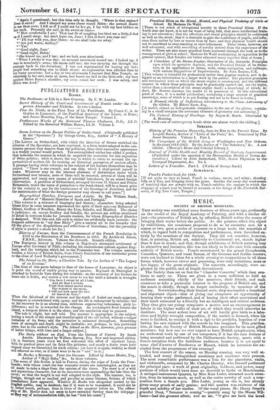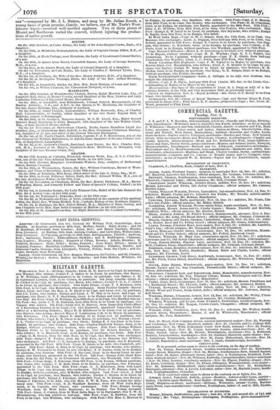MUSIC,
SOCIETY OF BRITISH MUSICIANS.
THIS society was established some fourteen or fifteen years ago, professedly on the model of the Royal Academy of Painting, and with a similar ob- ject—the promotion of British art, by affording British artists the means of bringing their works before the public. As the painters effect this object by exhibitions, the musicians proposed to do so by concerts; aud, for a season or two, gave a series of concerts on a large scale, the materials of which, in regard both to composition and performance, were furnished en- tirely by the members of the Society. They did not consider, however, that, in painting, British art, relatively to Continental art, stands higher than it does in music; and that, though exhibitions of British painting may be attractive and lucrative, this was not likely to be the case with concerts entirely of British music. People accustomed to the grand Symphonies, Concertos, Quartets, and vocal &Ansa, of the German and Italian masters, were not inclined to listen for a whole evening to compositions in all these forms, which, however clever and promising, were only imitations, more or less happy, of the great originals. The concerts, accordingly, were ne- glected by the public, and at length discontinued.
The Society then set on foot the" Chamber Concerts," which they con- tinue to carry on. These are given in a room sufficient to hold an audience consisting chiefly of the members, their friends, and such amateurs as take a particular interest in the progress of British art; and the music is chiefly, though no longer exclusively, by members of the Society. Notwithstanding their limited scale, they accomplish a beneficial and important object—that of giving our composers an opportunity of hearing their works performed, and of having their effect ascertained and their merit estimated by a friendly but an intelligent and critical audience. They thus give our young composers a motive and an encouragement to labour in the higher walks of their art, of which they would otherwise be destitute. The most ardent love of art will hardly give birth to a labo- rious and highly-wrought composition, if the author is doomed, when his score is finished, to consign it with a sigh to his portfolio, hopeless of ever having his ears rejoiced with the sounds he has imagined. This gratifica- tion, at least, the Society of British Musicians provides for its most gifted members: but how can we ever expect to have British symphonists, when au orchestral work by one of our composers, if it has the rare fortune of being accepted and performed by the Philharmonic Society, meets with a frozen reception from the fastidious audience, because it is not equal to some chef d'ceuvre of Beethoven or Mozart, which its intrusion has ex- cluded from the programme of the evening? The first concert of the season, on Monday evening, was very well at- tended, and many distinguished musicians and amateurs were present. The most remarkable performance was a Trio for the pianoforte, violin, and violoncello, composed by Mr. Charles Horsley, who himself performed the principal part: a work of great originality, boldness, and power, many portions of which would have done no discredit to Spoilt. or Mendelssohn. A stringed-instrument Quartet, by Miss Kate Loder, attracted much atten- tion, from its intrinsic merit, as well as the entire novelty of such a com- position from a female pen. Miss Loder, young as she is, has already given many proofs of early genius; and this quartet was evidence of the depth and solidity of' her studies. Of the vocal pieces, Mr. Henry Smart's graceful Duet, "Summer is coming "—prettily sung by the Misses Wil- liams—had the greatest effect; and an air, "0 give use back the loved one "-composed by Mr. J. L Hatton, and sung by Mr. Julian Kench, a young basso of great promise, (lately, we believe, one of Mr. Tune's West- minster boys)-received well-merited applause. Two or three pieces of Mozart and Beethoven varied the concert, without injuring the produc- tions of native growth.



























 Previous page
Previous page